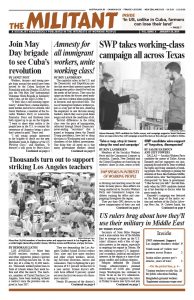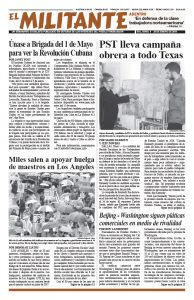In response to a rise in the price of bread, tens of thousands of working people have joined protests since mid-December in cities across Sudan. The price increases came on top of years of grinding hardships, civil war and political repression.
The government, which controls the cost of some basic necessities, tripled bread prices Dec. 19, sparking the demonstrations. Protesters have taken to the streets almost daily, unbowed by the government’s imposition of a state of emergency and attacks on their actions. One popular slogan at the protests is, “Freedom, peace and justice.” And they’re now demanding an end to President Omar Hassan al-Bashir’s rule.
“We’ve been living without dignity,” Aseel Abdo, a 25-year-old woman who participated in the protests, told the Washington Post Jan. 6.
The actions have drawn support from some trade unions and the country’s bourgeois opposition parties. Inflation has risen 70 percent over the past year.
For months working people in Sudan have faced growing shortages of food, medicines and money, and long lines to get fuel.
Bashir has moved with force against demonstrators. The army has been mobilized and security forces have fired on protesters. Many schools and universities are closed. The government says 24 people have been killed since the actions began, but Amnesty International estimates over 40. Numbers arrested are between 800 and 2,000.
Bashir fired his health minister Jan. 5, blaming him for the rise in the price of medicines. But protests have continued, extending for the first time to El-Fasher, the capital of North Darfur, Jan. 13.
Decades of war
The rising discontent comes on top of the deadly effects on working people of the Sudanese rulers’ wars. Bashir seized power in an 1989 coup, taking command in the bloody 1983-2005 civil war, which ended with the independence of South Sudan in 2011. As a result, the Sudanese rulers in the North lost control of most of the country’s oil fields, deepening the economic crisis for toilers there. Since the war ended, Bashir’s government has brutally repressed rebel groups in Darfur, and in the Blue Nile and South Kordofan regions.
Some 1.4 million people around the country are still unable to return to homes they fled during these conflicts.
The regime is trying to make alliances in the region. The Sudanese government has entered into an agreement with the Saudi monarchy to deploy troops to the Saudi-led coalition fighting Tehran-backed Houthi rebels in Yemen. Bashir’s government recently sought collaboration with Washington and the removal of Sudan from the U.S. rulers’ list of terrorist governments. Khartoum joined with Washington to help police the Libyan border. Washington lifted economic sanctions against the regime in 2017.

